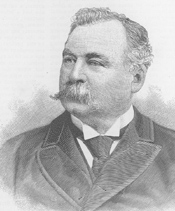William Elliott (American politician) facts for kids
Quick facts for kids
William Elliott
|
|
|---|---|
 |
|
| Member of the U.S. House of Representatives |
|
| In office March 4, 1887 – September 23, 1890 |
|
| Preceded by | Robert Smalls |
| Succeeded by | Thomas E. Miller |
| Constituency | 7th district |
| In office March 4, 1891 – March 3, 1893 |
|
| Preceded by | Thomas E. Miller |
| Succeeded by | George W. Murray |
| Constituency | 7th district |
| In office March 4, 1895 – June 4, 1896 |
|
| Preceded by | James F. Izlar |
| Succeeded by | George W. Murray |
| Constituency | 1st district |
| In office March 4, 1897 – March 3, 1903 |
|
| Preceded by | George W. Murray |
| Succeeded by | George S. Legaré |
| Constituency | 1st district |
| Member of the South Carolina House of Representatives from Beaufort County | |
| In office September 5, 1866 – December 21, 1866 |
|
| Preceded by | Stephen Elliott, Jr. |
| Succeeded by | Multi-member district |
| Personal details | |
| Born | September 3, 1838 Beaufort, South Carolina |
| Died | December 7, 1907 (aged 69) Beaufort, South Carolina |
| Resting place | Beaufort, South Carolina |
| Political party | Democratic |
| Alma mater | Beaufort College Harvard University University of Virginia |
| Profession | lawyer, politician |
| Military service | |
| Allegiance | |
| Branch/service | |
| Years of service | 1861–1865 |
| Rank | |
| Battles/wars | American Civil War |
William Elliott (born September 3, 1838 – died December 7, 1907) was an American lawyer and politician. He served as a U.S. Representative for South Carolina. This means he was elected to represent his state in the United States Congress, helping to make laws for the country.
Contents
William Elliott's Early Life and Career
William Elliott was born in Beaufort, South Carolina. He went to college at Beaufort College and then Harvard University. He later studied law at the University of Virginia. In 1861, he became a lawyer in Charleston, South Carolina.
Serving in the Civil War
When the American Civil War began, William Elliott joined the Confederate States Army. He started as a lieutenant and served throughout the entire war. By the end of the war, he had earned the rank of lieutenant colonel.
Starting a Political Career
After the war ended, Elliott went back to Beaufort. He started his own law practice there. Soon, he became interested in politics. In 1866, he was elected to serve in the state house of representatives for South Carolina. He also attended the Democratic National Convention in 1876, which is a big meeting where the Democratic Party chooses its candidate for president.
William Elliott in Congress
William Elliott ran for the United States House of Representatives several times. He was elected to Congress multiple times, representing South Carolina.
First Term in the House
Elliott was first elected as a Democrat to the Fiftieth Congress. He started his term on March 4, 1887. However, his election was challenged by Thomas E. Miller, an African American Republican candidate. Miller claimed there was election fraud, which was a problem in those years.
Elliott continued to serve in the Fifty-first Congress starting March 4, 1889. But on September 23, 1890, Congress decided that fraud had indeed happened. They declared that Thomas E. Miller had actually won the election. Miller then took Elliott's seat in Congress.
Returning to Congress
Despite this, Elliott was elected again to the Fifty-second Congress. He served from March 4, 1891, to March 3, 1893. He did not run for re-election in 1892.
More Contested Elections
Because of changes to voting districts in South Carolina, Elliott ran for Congress from a different district in 1894. This district had a majority of Black voters. He won the election, but it was again challenged. This time, the Republican candidate was George W. Murray, an African American lawyer. Murray also claimed there was widespread fraud.
Elliott began serving in the Fifty-fourth Congress on March 4, 1895. However, George W. Murray provided a lot of proof to Congress about the election problems. Congress agreed with Murray and decided he was the rightful winner. Murray took his seat in Congress on June 4, 1896.
Later Years in Congress
In 1896, South Carolina created a new state constitution. This new constitution made it very difficult for most Black citizens to vote. This meant the Republican Party, which many Black voters supported, became much less powerful in the state. From 1890 to 1908, many states in the Southern U.S. passed similar laws to prevent Black people and many poor white people from voting. This allowed the Democratic Party to control politics in the South for a long time.
Because the Democratic Party was so strong in South Carolina, the most important elections happened within the party itself. William Elliott was elected to the Fifty-fifth, Fifty-sixth, and Fifty-seventh Congresses. He served these terms from March 4, 1897, to March 3, 1903.
He did not run for re-election to Congress in 1902. That same year, he tried to be elected to the United States Senate, but he was not successful.
Later Life and Legacy
In 1906, President Theodore Roosevelt asked William Elliott to lead a special group. This group's job was to find and mark the graves of Confederate soldiers who had died in the Northern states. Elliott worked on this project until he passed away.
William Elliott died in Beaufort, South Carolina, on December 7, 1907. He was buried in St. Helena Churchyard.
 | Aaron Henry |
 | T. R. M. Howard |
 | Jesse Jackson |

